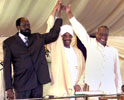
With the passing of the six-month mark before Sudan’s two referenda take place, some key international actors went on the record about their expectations and agendas as the countdown begins. The United States, United Kingdom, and Norway – also known as the Sudan Troika – issued a statement, as did the U.S. special envoy to Sudan Major General Scott Gration. Here’s a recap.
The Troika statement was for the most part unsurprising, filled with diplomatic buzzwords and uncontroversial language, and ultimately reaffirming the “support for credible, peaceful referenda in January 2011, the outcomes of which are respected by all.”
The statement did acknowledge the many challenges that face Sudan as it currently heads, unprepared, toward a potential divorce. Importantly, they highlighted the critical Abyei referendum—perhaps in response to some disconcerting murmurs within the NCP about sidelining the highly-anticipated vote, or the rising discontent in the area that acts as a reminder of the huge potential for violence. The joint statement said: “The Abyei referendum is an essential milestone of the CPA that cannot be overlooked and must be completed on time.”
And though the Troika joint statement did acknowledge much of the backpedaling of progress on the ground—such as the tightening of political and civil space since the conclusion of April’s elections and continuing insecurity in Darfur (some in part due to the Sudanese government’s intransigent violations of the ceasefire and use of aerial bombings)—there was nothing to suggest the three countries would do anything actionable beyond expressing “deep concern.”
The focus was slightly different in the Special Envoy Gration’s blog post, which seemed to serve as a reassurance to Darfur observers that he has not forgotten about the region. “While planning for the referenda is of the utmost urgency, we must not and will not lose sight of Darfur,” he wrote.
Ironically enough, in his emphasis on the need for international collaboration and partnership in resolving the Darfur conflict, Gration unintentionally pointed out a huge gap in such international efforts. “[T]here is no single government, institution, or organization alone responsible for ending the Darfur conflict,” he said. It’s true that no single international entity should take on Darfur by itself, but the need for a lead actor is clear.
So what’s next? The special envoy is going back to Sudan this Friday to participate in an international consultative meeting organized by the African Union on the Comprehensive Peace Agreement and the Darfur conflict. He also plans on traveling to Darfur later in the month.
Photo: Southern Sudanese leader Salva Kiir raises hands with Sudan’s President Omar al-Bashir and Vice President Ali Osman Mohammed Taha following his swearing-in ceremony as Sudan’s first vice president in Khartoum in 2005 (AP)

